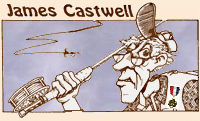|
Seven times seven is forty-nine. Eight times eight is sixty-four. Nine times
nine equals eighty-one. Easy stuff. At least it was way back then. Those
were the days of learning, when my brain was mush, easily able to grab an
idea, remember and use it. That's the way things are supposed to be, you
learn things when you are young.
Why was six times nine equals fifty-four harder to remember? I have no idea,
but it was. Some things are easier to learn I guess, at least they were for me.
Suppose I had a poor teacher, one who barely knew mathematics at all? And
suppose I had spent a few weeks learning six times seven was forty-three? Close,
but not quite correct. Then I had to re-learn the right answer later on in life? Yikes!
I might have spent years getting it wrong. So what's the big deal?
Several things come into play. First off, learning is harder later in life, we are not
still geared up for it. We produce things, not learn things. The brain is made up
that way. Learning is easier when we are young. Secondly, we would have to
'un-learn' the wrong thing. Not so easy now is it?
Let's apply this to fly-casting. I think you can see where I am going now. In fact,
you have been thinking your own thoughts as you have been reading this! That is
a point right here and now. We do that. We think while someone is talking to us.
We think of the answer to, or the question itself. We even finish sentences for the
other guy. The brain is in high gear, but not to learn, to survive. Much of the time
we play 'mental ping-pong' with each other. Not conducive to learning, but one
thing is conducive to learning and that is focus.
There are several reasons we do not focus. We may not want to seem 'too'
interested in the subject, heck we already know all that. We might think we
will never need the information, and indeed we may not. Then there is the
physical side, perhaps we don't think we can really do it without looking
silly or inept. Embarrassment, or the fear of it has held many back. Don't
forget, everyone watches the best caster in sight, it's hard to learn something
from the new guy. They will not pay any attention to you, they will be watching
the instructor.
I know a fellow who was at a seminar I gave on casting and the double-haul.
He didn't really pay a lot of attention to the double-haul part, figured he could
cast well enough and would never need to pitch ninety feet of fly line. Wrong,
he is working his tail-feathers off these days to learn. Needs it to use on a trip
to some tropical water destination. You just never know.
Some guys don't like to be seen out fly-fishing. They just look really bad. They
are afraid to be seen practicing casting for the same reason. I understand the feeling.
I'm not that darn good myself, but I am a whole lot better than I once was. And
I did have to learn, or make that 'un-learn and then learn.' It seemed to me the
double-haul was just adding some pulls both ways to normal casting. The same
type of casting I had done on small streams for years. Wrong, at least wrong
somewhat. It is true you can use the double-haul on a small rod in small areas,
I do it all the time, it divides the work between both hands, but it is mostly used
to get high line speed and distance from your equipment.
And it is not just dry fly casting with a pull. It is different, it is bigger, harder, and
wider. If you have a chance to watch a video or someone who really knows how
to do it. Watch closely. Focus, look for little things like when the heck does the
pull really start, how long or short is it, what does it really do, how far back does
the rod go, where is the stop. Does a long pull result in a big loop or a tight one?
The learning takes place inside your head. Pay attention, work hard, listen and
watch. The instructor can only offer so much, the rest is up to you, he can't learn
it for you.
 The double-haul? It's as easy as 1,2,3, or ABC. Don't practice mistakes, get it
right the first time. Six times seven is forty-two. ~ James Castwell
The double-haul? It's as easy as 1,2,3, or ABC. Don't practice mistakes, get it
right the first time. Six times seven is forty-two. ~ James Castwell
|



